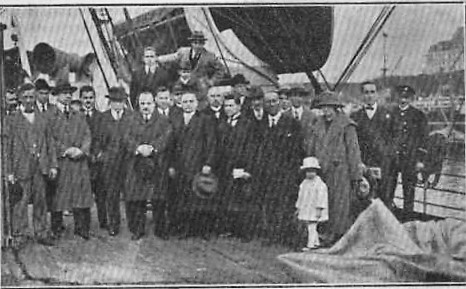
| Back | Index | Next |
Translator: Eduardo Freire Canosa
(University of Toronto Alumnus)
I grant the translations herein to the public domain

(1896)
Translator's Notes
"Un Adiós a Mariquiña" (Good-Bye, Lassie), was a farewell written in 1896 by Enríquez for Mariquiña Puga the nine-year-old daughter of his defence lawyer and close friend Luciano Puga who was emigrating to Cuba.
"Un Adiós a Mariquiña" uses one affectionate diminutive, "pombiña": Dim. of "pomba" (dove, pigeon) translated "small...pigeon" (3.1) to convey the childhood of Mariquiña and "little pigeon" (6.3) to convey affection. Other options: cute dove, darling dove, lovely pigeon.
Explanation of some words, terms or expressions
Mariquiña (1.2). As a generic noun it means "lassie." As a personal name it is the pet form of "Mary" (e.g. Molly). My use of the first definition for the poem's title is intended to broaden the farewell dedication to every small girl who emigrated with her family.
Musical Adaptation
"Un Adiós a Mariquiña" was put to music by the distinguished Galician composer José Castro González.
|
|
Joaquín Deus (vintage recording) |
|
|
Antonio Campó (vintage recording) |
|
|
Javier and Xurxo Romaní (vintage recording) |
|
|
Juan Pardo from the 1973 single Adios A Mariquiña |
|
|
Ana Häsler (min. 14:30-18:50) and the Galicia Philharmonic at the Amadeo Roldán Theatre in Havana (Cuba) |
|
|
Mezzosoprano María José Ladra and Margarita Viso at the piano |

Small carrier pigeon of white feather...
|
Como ti vas pra lonxe i eu vou pra vello,
Cando deixes as costas da nosa terra
Pombiña mensaxeira de branca pruma,
Dílles que pra seus lares tornen axiña
Dílles que non hai terra millor que a nosa,
Dílles que as suas obrigas aquí ós esperan |
Since you are going far away and I'm growing old
When you leave the shores of our land
Small carrier pigeon of white feather:
Tell them to hurry back to their homes
Tell them that there is no better land than ours,
Tell them that their duties await them here |
| Back | Index | Next |